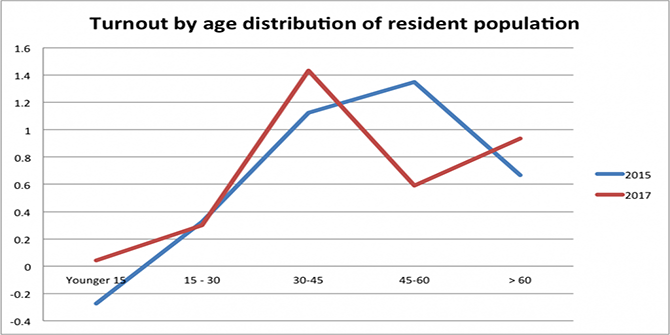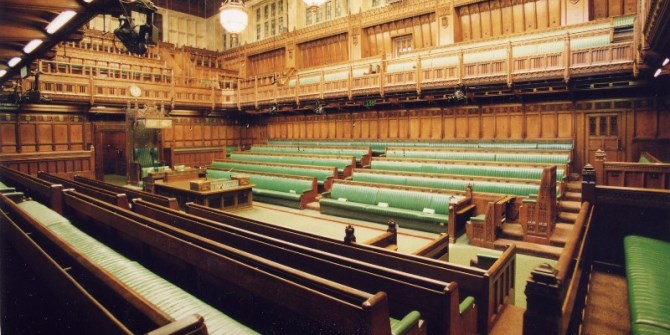 Social democratic politics in Britain requires compelling answers to three questions that Roy Jenkins posed in 1979, writes Patrick Diamond. He revisits Jenkins’s words by considering the prospects for ‘breaking the mould’ of UK politics in the time of Brexit and permanent austerity.
Social democratic politics in Britain requires compelling answers to three questions that Roy Jenkins posed in 1979, writes Patrick Diamond. He revisits Jenkins’s words by considering the prospects for ‘breaking the mould’ of UK politics in the time of Brexit and permanent austerity.
The year 2019 marks the fortieth anniversary of Roy Jenkins’ Dimbleby lecture, Home Thoughts from Abroad, which led indirectly to the formation of the Social Democratic Party (SDP), a major event in British political history that threatened to destroy the Labour party. Social democratic politics still requires compelling answers to three of the central questions that Jenkins then posed. Firstly, how to reform the British system of democracy to develop a culture of political participation and pluralism that leads to more equitable economic and social policies. Secondly, how to unite the centre-left parties to forestall long periods of Tory dominance in electoral politics, avoiding ‘blunders’ such as the 2016 referendum on EU membership. And, thirdly, how to cultivate an intellectual ecosystem on the progressive Left that generates radical ideas for social reform. It is all too obvious that liberal social democrats need a governing agenda and political strategy for the ‘new hard times’ of Brexit and ‘permanent austerity’.
Those who have identified with the British social democratic tradition have found themselves in ignominious retreat over the last decade. The conventional centre-left vision has at times amounted to little more than kneejerk repudiation of Brexit. There has been an astonishing reluctance to engage in serious thinking about the long-term consequences of the worldwide financial crisis. Moreover, little thought has been given to what is a viable national strategy for the UK in the aftermath of departure from the EU. Fundamental questions remain unanswered. What is the social democratic view of a fair capitalism, an effective state, a good society? Through what strategy should the centre-left address Britain’s broken system of democracy that produces outcomes so disillusioning for so many citizens? Social democrats need to cease justifying the status quo, becoming a radical movement of ideas again. The newly formed Independent Group of MPs now face exactly that challenge, as do those in the Labour party who still subscribe to the broad tradition of social democracy.
Labour has made strides in its thinking about the British economy in recent years. Yet the party’s ideas continue to be shaped by a nostalgic worldview centred on the revival of heavy industry, accompanied by a return to collectivist modes of trade union organisation. By emphasising a return to the orthodoxies of public ownership and state planning, Labour is attempting to revive the corporatism of the 1960s and 1970s. The social democratic vision of the economy should recognise the centrality of local communities, households and natural resource scarcity to future growth and well-being. Economies will be increasingly decentralised, shaped by a diversity of co-operatives, social enterprises and small businesses linked together through ‘anchor’ institutions. The centre-left has to address the digital and collaborative economy spanning global production, households, and local economies rather than retreating to the statist orthodoxies of the past.
Equally, the centre-left’s politics of redistribution is ripe for rethinking. On tax and public spending, the Labour leadership has been paralysed by ambiguity and indecision. The 2017 manifesto makes clear the party aims to tax the rich more aggressively. Yet we know little about what proportion of national income Labour believes is necessary to fund public services. Since Corbyn became leader, there has been little effort to develop an argument that high-quality schools and a well-funded NHS require all those of working age to pay more in tax, potentially through a reformed National Insurance system.
The elephant in the room of UK state spending is the sheer scale of resources consumed by the NHS: by 2023, according to Paul Johnson of the Institute for Fiscal Studies (IFS), health spending will amount to 38% of national income. In relation to fiscal redistribution, Labour’s 2017 plans were judged by the IFS to be less progressive than those of the Liberal Democrats. The party’s thinking on welfare and poverty has not moved far since it lost office in 2010. Yet wealth inequalities have soared. Social democrats must develop programmes that strengthen the link between citizens and taxes; they have to devise imaginative schemes to effectively tax wealth, inheritance, capital gains and property; they need a strategy that declares a generational war on child poverty.
However, little progress will be made in addressing the politics of production and distribution without fundamental reform of British institutions and the state. In the Dimbleby lecture, Jenkins claimed it was time to ‘break the mould’ of British politics. Forty years later, it is clear that mould has begun to fracture. There has been a further weakening of traditional voter loyalties. UK territorial politics is in flux. The relationship between representative and direct democracy is under strain in the aftermath of the EU referendum. The electoral system no longer fits the transformed political landscape of Britain.
Yet a new politics is not just about reform of electoral systems, as Jenkins assumed in the late 1970s. Politicians of all ideological complexions are increasingly viewed as remote and professionalised. Ministers are grappling with complex problems which make them increasingly dependent on experts. The political class suffered a catastrophic loss of trust and disconnection due to its track-record of apparent incompetence. Bureaucracies are perceived as ever more remote and distant from citizens. The challenge for social democrats, whether in the Labour party or outside it will be to rediscover, as Jenkins foresaw, an improved method for doing politics that addresses the needs of a diverse and complex society.
_____________
Note: the above draws on the author’s published work in The Political Quarterly.
 Patrick Diamond is Senior Lecturer at Queen Mary, University of London.
Patrick Diamond is Senior Lecturer at Queen Mary, University of London.
All articles posted on this blog give the views of the author(s), and not the position of LSE British Politics and Policy, nor of the London School of Economics and Political Science. Featured image credit: Pixabay/Public Domain.








Recent events confirm the complexity of the issue. Social democracy is the radical & caring politics of change towards a fairer society.It lies close to the centre ground of British politics addressing the global issues such as climate change as well as delivering detailed policies locally enabling growth to enrich knowledge and the quality of life for all.
Where do we from here? 2025 is the next opportunity to deliver a thought through social democratic option for the UK. No need to rush then or even panic.There is time for the development of policies as the expression of British (not English) values. The biggest challenge will be the emergence of a new socially committed Tory party, favoured both by Northern community pragmatism and Southern shire conservatism.
Marxist preaching from well off “entitled” urban suburbs is still the big danger; indulgent and irrelevent in the 21st century.
The centre-left, the liberal and/or social democrats, etc. have failed dismally. The Left is now considering whether internationalism is really the way to go to achieve the socialist Internationale. Perhaps democracy was not such a bad idea after all. Looking back, since the union movement was brought on board with the corporate globalisation steamroller, the old West, Western Europe and Australasia, have effectively been run by a one-party statist system of government. In the UK, as in most of the old West, the Conservatives-Tories-free market-liberals have been in charge whether in or out of government. In the UK, Labour in government could not run the country, but it would run the country down, while the Tories would be still on charge.
As for Brexit, anyone who is against Leave does not understand democracy or, if they do, is against democracy in principle. In some countries, social democrats have done well, but in a country with FPTP the contest between tweedledumb and tweedledee has not been a contest since, probably, Jenkins’ Dimbleby lecture. The Establishment runs the show, no matter whether its the Tories or Labour or a coalition is in charge. That is because the opposition is not real. Those people who might be politically active against the Establishment are beholden to the Establishment bar a few exceptions. The broad Left has always been only too keen to be brought on board the establishment-run taxpayer-funded gravy train. The politicking, protesting and manoeuvring on the part of political operatives on the Left has been almost exclusively been serving the material-economic-financial interests of the political operatives. No alternative to the status quo worth mentioning has ever been formulated and enumerated from the broad Left. Few people in the West would vote to live in a Cuba economy, even though the majority in the EU member states, other than the UK, appear to be submitting to a federalisation scheme which, politically, would in practice be an autocratic set-up like it.
What should a social democracy in the UK look like, practically speaking? Although many a Leftist agenda is seriously entertained, no such agenda has been a serious contender to replace what goes for capitalism. No serious vision, if any, has emanated from the Left, centre-left or further left or far left worth considering for the West, let alone worth considering for the new West, the US. The lib-dems, social dems or some combination of in the UK have not offered an alternative which a majority could vote for. A majority voted to keep FPTP last time there was a plebiscite on it. The very people who have the time and skills to formulate an alternative vision have done little if anything in the last forty years. For that we are depending on the so-called Right and those dissenters and heretics on the ruling establishment side. Look at Bernard Connolly, Farage and scores others from within the system. Few of these would identify with the Left, in the UK. Elsewhere the picture looks more promising. What to do? Best hold on to your job, stipends, sinecures, etc. and hope your pension is secure. Best not upset the people in charge of spending taxpayers’ moneys and operating pension funds.
While I agree that Labour’s current policies are often backward looking and incoherent, I am not entirely convinced that bringing back the SDP as a centre-left party will solve the problems of production and distribution cited. And I think the author must mean 38 per cent of government spending, as 38 per cent of national income would imply almost all government spending was going on the NHS.